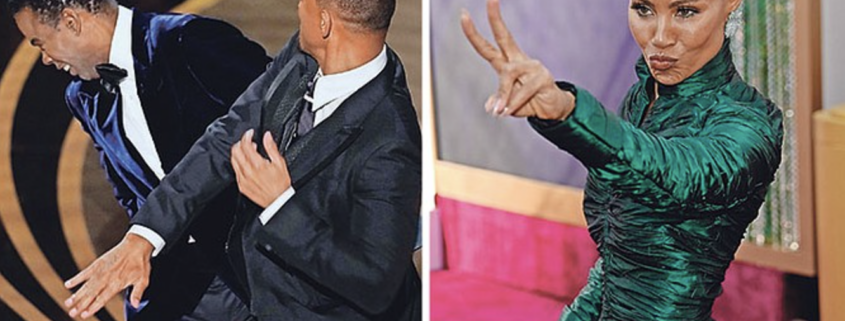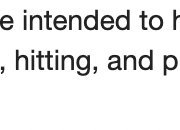“Jada, I love ya, GI Jane 2, can’t wait to see it, aight?”
That is what Chris Rock said on stage at the Academy Awards on Sunday night. He used the 1997 movie GI Jane which starred Demi Moore with a buzzcut to reference Jada Pinkett-Smith’s bald head. Pinkett-Smith’s bald head is not exactly a style choice, but the result of alopecia. On Sunday night, sitting in the audience, she was visibly annoyed by the comment, rolling her eyes, showing exhaustion.
In 2018, Pinkett-Smith shared on Red Table Talk, her Facebook Watch series, that she had been experiencing hair loss, had gone through many tests, and did not know what was causing it. She said, “It was terrifying when it first started.” She recalled being in the shower and having hair in her hands. In that episode, she talked about losing the choice to have hair or not have hair. In December 2021, she shaved her head and shared her new look on Instagram, connecting it to her struggle with alopecia.
Rock seemed to know the “joke” did not land the way he thought it would, and insisted that it “was a nice one”. He said, “Wuh-oh!” as Will Smith bounded toward him in a way that was clearly not friendly. He laughed until the point that Smith slapped him. ‘Oh, wow. Wow,” he said as Smith turned around, headed for his seat.
Smith told Rock, from the audience, to “keep [his] wife’s name out [his] [expletive] mouth.” Rock attempted to defend himself, noting that it “was a GI Jane joke.” Smith repeated himself, and Rock responded, “I’m going to, okay?” The video clip is being shared over and over again on social media and with that, of course, comes the commentary. The incident sparked conversation about violence, racism, respectability politics, ableism, and cancel culture among many others.
In the video, it is clear that Smith laughed at Rock’s reference to Pinkett-Smith as GI Jane. He, apparently, found it funny. In the same frame, it is clear that Pinkett-Smith was not amused, but Smith was not looking at her in that moment. The video does not show what happens next between Smith and Pinkett-Smith, but it is likely that he realised she did not appreciate the joke. We can guess that he was dealing with the negative impact that the comment had on Pinkett-Smith as well as his participation in the laughter by the audience. His reaction may have been more than anger toward Rock, but his own guilt for not remembering Pinkett-Smith’s struggle and laughing at her expense.
Alopecia areata is an autoimmune disease — a condition in which the immune system attacks the body. Other autoimmune diseases include rheumatoid arthritis, multiple sclerosis, and Graves’ disease. In alopecia, the white blood cells attack the cells in hair follicles. It can affect people who are blood relatives of a person with alopecia and people who have thyroid disease, vitiligo, down syndrome, hay fever, and a number of other conditions.
Congresswoman Ayanna Pressley tweeted about the moments of vulnerability that only those closest to people with alopecia ever see. She emphasised the importance of loved ones being there to provide support. She also made it clear that people’s health should not be material for “jokes”. She said, “Our bodies are not public domain. They are not a line in a joke – especially when the transformation is not of our choosing.”
In recent years, there have been several public debates about comedy and what is and is not appropriate content for jokes. The generally accepted rule is that comedians need to “punch up”, meaning people in situations of vulnerability should not be disrespected or used to get laughs. Jokes should not be, for example, about survivors of abuse or people who are systemically disenfranchised. In his apology, Smith noted that being the butt of the joke comes with the territory of his celebrity, and that he did not expect Pinkett-Smith to be targeted. This seemed to be an acceptance of the idea that he, a wealthy person in the public eye, is fair game. He seemed to, in that moment on Sunday night, draw the line at Pinkett-Smith — also wealthy and a celebrity —being fair game due, not only to her having a medical condition, but her medical condition actually being the “joke”.
As people become more socially and politically aware, and more cognizant of issues of inequality, less and less of what was once considered funny is acceptable today. As such, it is not particularly surprising that there are conversations about the relevance of (certain kinds of) comedy and what it takes, and will take in the future, to command a stage and bring humour that engages, informs, and inspires as opposed to pandering to the people with enough power, influence, and health or disconnected enough from the realities of the world to be unaffected by unintelligent quips. There has to be recognition that what passes for comedy, in many cases, is violence.
Most of us understand that Smith’s actions against Rock were violent. He physically assaulted Rock. What happened before Smith assaulted Rock does not excuse this act of violence. It does not matter that his action came in response to an inappropriate comment directed at Pinkett-Smith and her reaction to it. What really matters here is that Smith’s immediate reaction, after laughing and then seeing Pinkett-Smith’s reaction, was to physically assault the person he thought was wrong.
Smith’s action has been characterised by one group of people as one of violence and by another group of people as one of heroism. The position of the first group of people is easier to understand, if only because the violence we understand best is physical. We understand it even better if it is between men. Then, it is treated as a special variant of violence when it occurs between two Black men. Of course, there has been the rhetoric about Black people’s behaviour in “mixed company” and the burden that is on Black people to be on their best behaviour when in view of white people who are known to use any and every opportunity to characterise Black people in certain ways which include inherently violent.
Black people are not allowed to make the same mistakes as white people because a mistake made by a Black person becomes a character trait of all Black people. We use this — is it knowledge or fear? — as an excuse for policing Black people, holding each other to impossible standards with the absurd expectation that our engagement in respectability politics will end racism. Wrong. Respectability politics and this constant policing of Black people is abhorrent and it does nothing to address racism or anti-blackness. Still, many people in that first group — the people who saw violence when Smith slapped Rock — are most upset that a Black man did this on one of the biggest world stages, concerned that it projected an image, a meaning, and a fate on every other Black man.
Unfortunately, that moment also led to projections on Black women who, somehow, continue to be blamed for the violent acts of men. This brings us to the second group of people. Those people believe Smith did the right thing, defending Pinkett-Smith’s honour and making a statement (about his wife and all matters related to her) to everyone who witnessed it.
The people chanting, “Protect Black women,” in support of Smith’s action are not seeing the continuum of violence. Yes, Black women are vulnerable. Yes, Black women are disproportionately affected by violence. Yes, the protection of Black women is, today, absolutely necessary, and we need to get to the point at which Black women do not need protection. Yes, Rock’s comment was violent and we saw a glimpse of the harm it caused. We cannot, however, see the violence in speech and supposed comedy and ignore or excuse the violence of Smith’s response. We must not try to portray particular types of violence as moral or good. We have to demand different, more effective responses. We cannot end violence or convince other people to stop participating in violence by enacting another form of violence and declare it superior or morally sound.
It is also important to note that Smith’s action was a way of actively participating in patriarchy, asserting his masculinity, and positioning Pinkett-Smith in a very specific way — in relationship to him. When he spoke to Rock from his seat, he never used her name.
Twice, he told Rock not to use her name, referring to her as [his] wife. He was saying that Pinkett-Smith is in relationship to him, and he would not sit down and watch her be discussed, targeted, disrespected, or embarrassed. This was not a moral position, or an attempt to protect all Black women, but a personal position about a personal relationship and the way Pinkett-Smith’s feelings and reactions impact the perception she and others have of him.
This led to conversations about what women expect of their husbands and boyfriends. On a radio talk show yesterday morning, it was suggested that men fight over women and go to jail because of it, and the women end up in relationships with other people. This comment seemed to have been made to suggest that women cause men to engage in violence. This is not surprising since women and girls are regularly blamed for the sexual violence they experience, whether it is sexual harassment or rape. Women are made responsible for the behavior of men while men are not held accountable for the decisions they make. In addition, it is rarely acknowledged that men behave in these ways, not out of love or concern, but out of a sense of ownership. “My girlfriend.” “My wife.” “My woman.” “My gal.” They see themselves as owners and women as property, so violence against “their” women is perceived as violence against them, an act of disrespect, and a call to prove their masculinity. This may be viewed as a form of affection or a way of proving or demonstrating relationship status, and some women may believe this is evidence of love, but it is violence and it is self-serving. Smith’s action did not protect Black women. In fact, it quite obviously contributed to the fodder of people who infantilise men by blaming women for men’s behaviour.
We desperately need to think about the place violence has in our lives, and the ways we are prepared to use it or encourage others to use it to get what we want. That may be respect, feelings of love, public demonstrations or evidence of relationships, or something else. Violence is not and cannot be the answer to our problems, the way we reach desired social status, or a means of protecting anyone, particularly from violence. As Smith stated in his apology, “Violence in all of its forms is poisonous and destructive.” Violence will not give us what we need. We need to heal, and we need to build.
Published in The Tribune on March 30, 2022.









Leave a Reply
Want to join the discussion?Feel free to contribute!